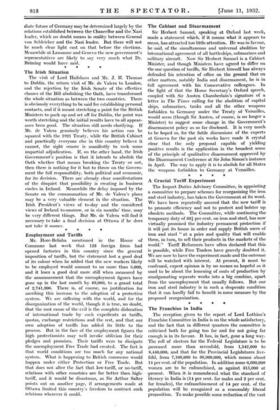Employment and Tariffs
Mr. Hore-Belisha mentioned in the House of Commons last week that 123 foreign firms had opened factories in this country since the general imposition of tariffs, but the statement lost a good deal of its colour when he added that the new workers likely to be employed would amount to no more than 8,000, and it loses a good deal more still when measured by the announcement that the unemployment figures have gone up in the last month by 89,000, to a grand total of 2,741,306. There is, of course, no justification for ascribing this increase to the adoption of a protective system. We are stiffering with the world, and for the disorganization of the world, though it is true, no doubt, that the root cause of the evil is the complete dislocation of international trade by such expedients as tariffs, quotas, exchange restrictions and the rest, and that our own adoption of tariffs has added its little to the process. But in the face of the employment figures the high protectionists may well invoke oblivion for their pledges and promises. Their tariffs were to dissipate the unemployment Free Trade had created. The fact is that world conditions are too much for any national system. What is happening to British commerce would happen under either Protection or Free Trade. But that does not alter the fact that low-tariff, or no-tariff, relations with other countries -are far .better thaw high- tariff, and it would be disastrous, as Sir Arthur Salter points out on another page, if arrangements made at Ottawa limited this country's freedom to contract such relations wherever it could.


































 Previous page
Previous page